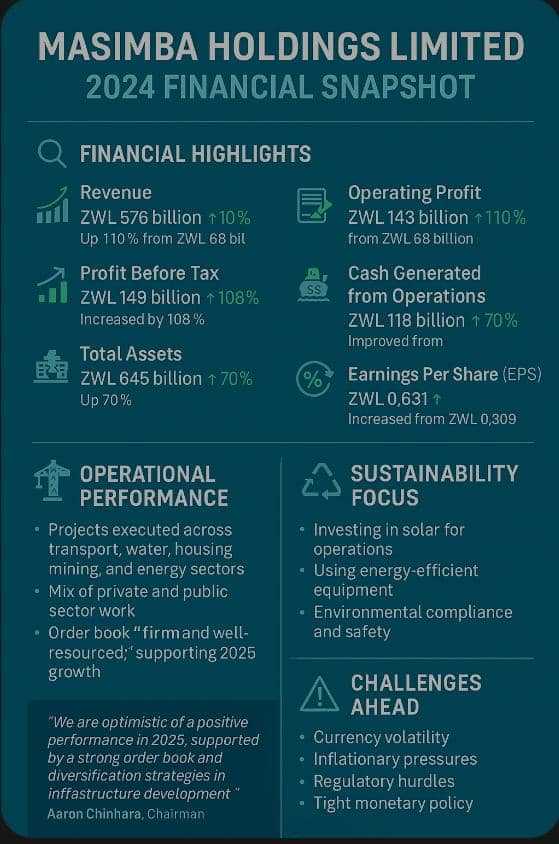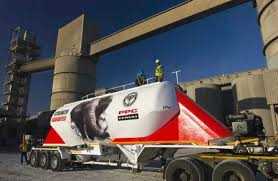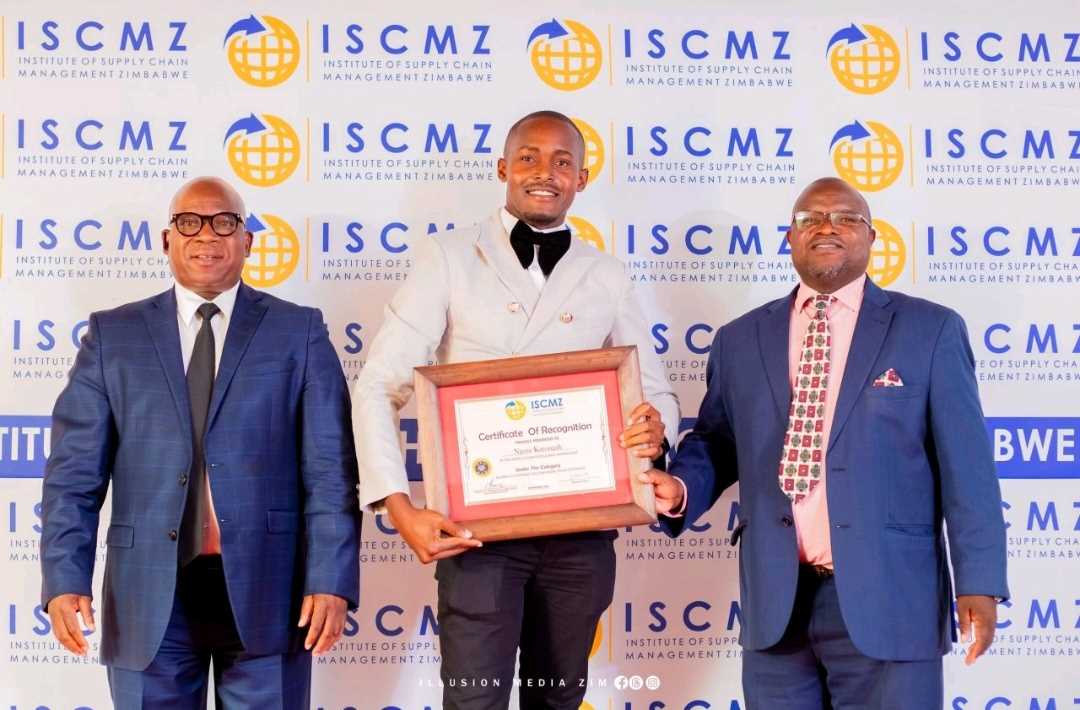
Audrey Galawu- Assistant Editor
Masimba Holdings Limited is entering 2025 with a confident outlook, projecting growth in turnover and profitability despite Zimbabwe’s uncertain economic landscape. The Group's optimism is rooted in a robust order book, operational efficiencies, and a deepening focus on sustainable infrastructure development.
As inflationary pressures, tight monetary policy, and regulatory bottlenecks continue to weigh on the construction sector, Masimba is banking on strategic discipline and ESG alignment to stay ahead of market turbulence.
“Despite tight monetary conditions and regulatory headwinds, our strong order book and diversification strategy position us well for continued growth in 2025,” said Chairman Gregory Sebborn in the company’s latest report.
“We are cautiously optimistic and focused on operational efficiencies that deliver value to all stakeholders.”
The Group posted revenue of US$56.1 million for the year ended 31 December 2024, a 4% increase from US$53.8 million in 2023. The modest top-line growth was achieved in a year marked by constrained liquidity and rising input costs, particularly affecting infrastructure projects.
Earnings before Interest, Tax, Depreciation and Fair Value Adjustments rose by 8% to US$13.6 million, up from US$12.6 million the previous year. This improvement was driven by enhanced project site efficiencies and strict cost containment initiatives.
Capital expenditure was strategically trimmed to US$2.5 million, down from US$4.2 million in 2023, and channelled into modernising equipment for long-term efficiency. The investment was funded through a five-year vendor financing arrangement, reflecting prudent financial planning.
Total assets rose by 7% to US$92.3 million, while borrowings increased slightly to US$2.5 million. However, equity growth helped reduce the gearing ratio to 7%, down from 8%, signalling improved financial resilience.
In a significant vote of confidence, the Board declared a full-year dividend of US$0.35 cents and ZWG$3.17 cents per share—the first dividend payment since 2022.
Although the Contracting unit maintained a stable order book, execution was affected by a deteriorating cashflow environment and a growing debtors' book—reflecting wider liquidity challenges in Zimbabwe’s construction sector. Nevertheless, the Group’s diversified operations helped buffer the impact.
Related Stories
Subsidiary Stemrich Investments contributed positively by expanding into precast units and supplying aggregates, while properties under rental management achieved 100% occupancy, generating consistent income amid market volatility.
The Fabrication unit also delivered major structural works at the new Mbare Musika vendor market, erecting 134 tons of steel within record time and reaffirming the company’s project delivery capabilities.
Masimba’s approach to Environmental, Social, and Governance (ESG) principles is not just symbolic—it’s systemic.
In 2024, the Group recorded zero fatalities and over 15.9 million lost-time injury-free work hours. It retained its ISO 45001:2018 (Occupational Health and Safety), ISO 14001:2015 (Environmental), and ISO 9001:2015 (Quality Management) certifications.
It also made significant strides in environmental sustainability:
- Adopted solar energy at operational sites.
- Reduced electricity consumption by over 67% (from 127,569 kWh in 2023 to 41,406 kWh in 2024).
- Lowered water usage to 17,901 m³, down from 62,210 m³ the previous year.
- Planted more trees at borrow pits as part of land rehabilitation efforts.
- Generated over USD10,000 in salvage value from recyclable waste streams.
Community impact initiatives included clearing three hectares for wheat farming at Mushandike High School, building classroom blocks at Katawa Primary School in Ngezi (in partnership with Karo Mine), and supporting arts and gender equality campaigns in Harare.
Perhaps most significantly, Masimba served as the contractor for the Great Zimbabwe Hydropower Plant, a 5MW renewable energy facility commissioned in November 2024 at Lake Mutirikwi. The project is a milestone for green infrastructure and positions the Group as a key player in Zimbabwe’s energy transformation.
While government infrastructure initiatives and a projected 6% GDP growth in 2025 provide tailwinds, Masimba is aware of persistent risks—particularly inflation, capital constraints, and regulatory unpredictability.
However, the Group believes that its proactive cost control, disciplined capital management, and long-term investment in sustainability will allow it to thrive even in uncertain terrain.
As Sebborn noted: “Careful navigation of risk will be essential. But we are confident that with strong fundamentals and responsible growth strategies, we are well placed to deliver sustainable value.”


















Leave Comments